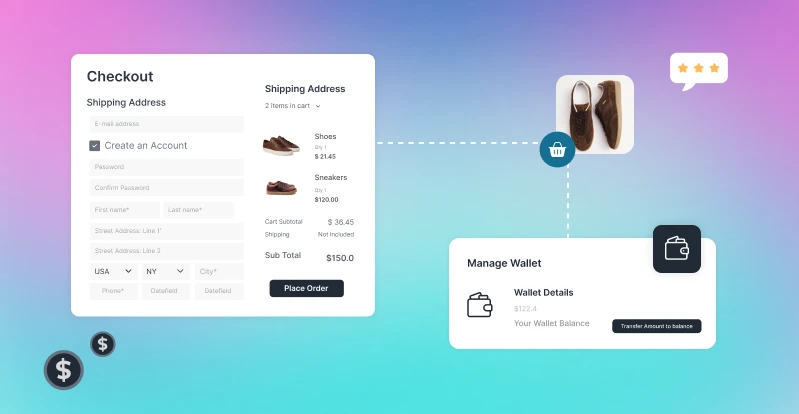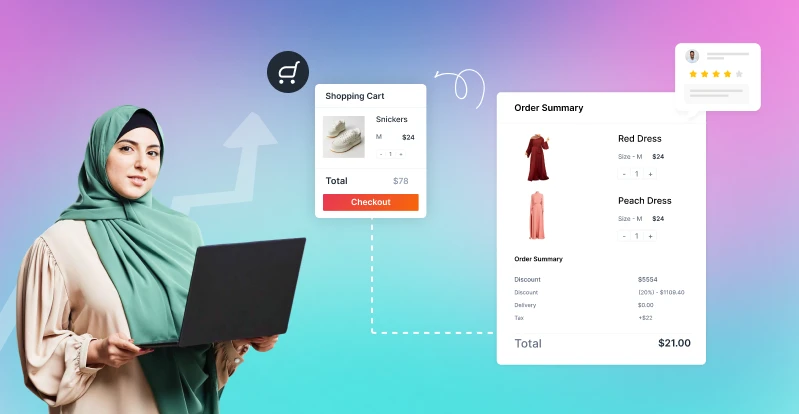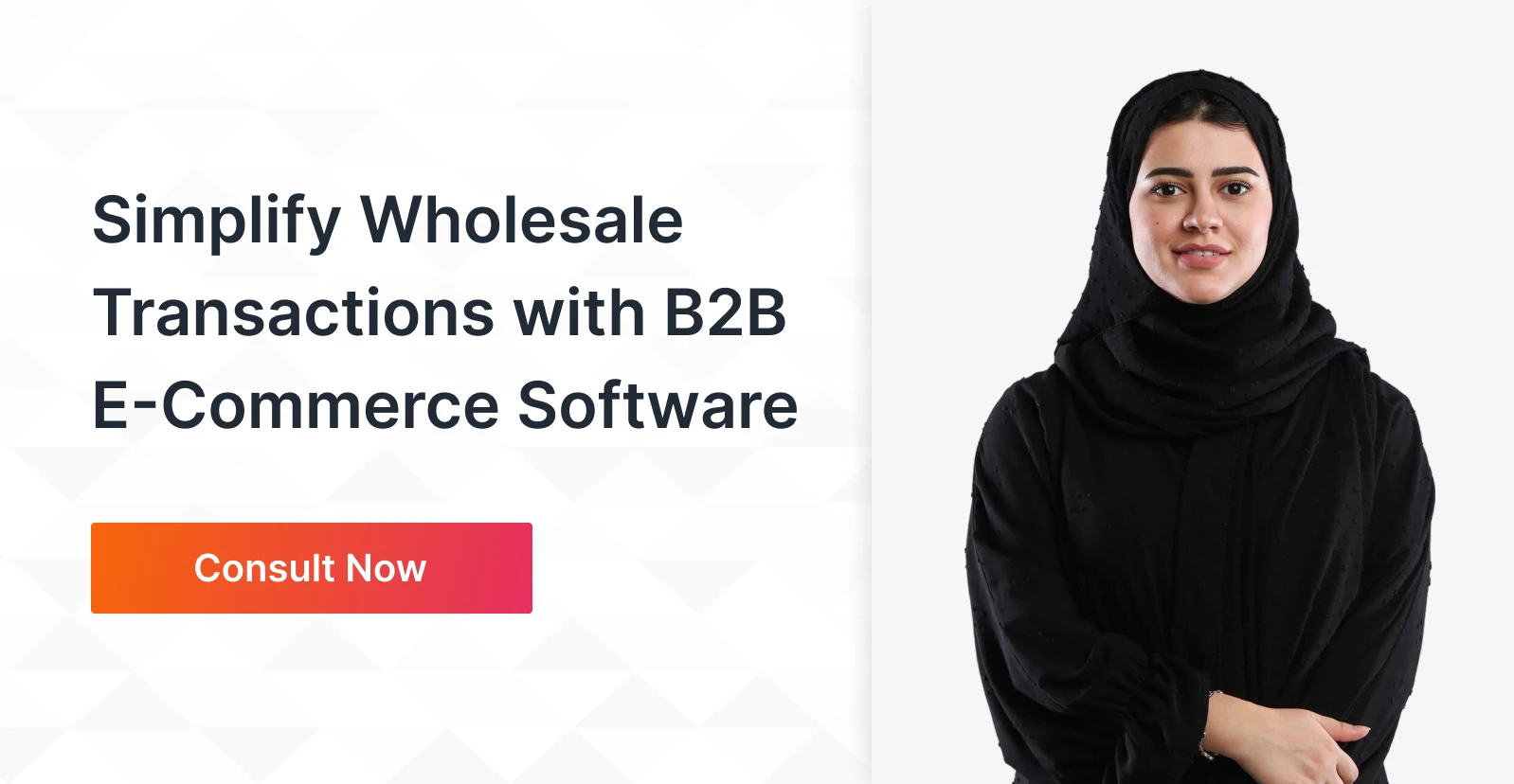A Complete Guide to B2B E-Commerce Wholesale Software & Platform

Table of Contents
B2B e-commerce refers to the software solutions that assist businesses in selling items to other businesses online. For the wholesale industry, the pandemic of 2020 appeared as a guide to a new direction while explaining the significance of online presence.
It was found that the majority of the B2B buyers preferred to order and pay online during that time, and thus, the B2B wholesale platform reached its peak. Moreover, the recent advancements in technology and the evolution in consumer behaviour further aided the growth of this industry.
Unlike the traditional B2C platform, this type of industry deals with features like protected access, inventory and bulk order management, and inclusive Enterprise Resource Planning (ERP) systems.
However, in this article, we will delve into the sphere of B2B eCommerce software, discovering the features and benefits of B2B e-commerce wholesale platforms along with identifying the potential real-life applications of the software solutions available.
Brief Overview of B2B and Wholesale E-Commerce
Before digging deeper into the article, firstly, let’s first understand the concepts of B2B and wholesale e-commerce and whether both are the same or have some differences. Well, usually, wholesale ecommerce is considered to be one type of B2B model.
The B2B setup enables the business owners to sell bulk products at a discounted rate to other retailers instead of selling directly to the end users. Specifically, B2B wholesaling is a more inclusive part involving both retail and wholesale components. However, there is a difference in terms of handling the stock.
The retailers tend to sell small amounts of products following standardised delivery services, whereas wholesalers deal with larger stocks with the support of widespread logistics systems.
What are the benefits of B2B e-commerce wholesale platforms?
Amidst the huge competition, implementing B2B eCommerce solutions in Saudi Arabia will be an impactful option to advance business operations and increase customer satisfaction while improving the overall growth of the business. Nevertheless, some advantages of this platform are highlighted below:
- Provides an inclusive buying experience to the customers.
- Automated processes assist in simplifying tasks and make the business responsive.
- Effective virtual presence helps to reach audiences worldwide by removing geographical barriers.
- Ultimate access to real-time data of consumer behaviour enables businesses to optimise marketing strategies and value consumer preferences.
- Operate a business through internet-connected mobile devices while being cost-effective.
Choosing the right Wholesale B2B E-commerce Platform
Expectations of sellers are evolving day by day, and therefore, they seek support from an advanced and modern B2B platform to meet their desired goals. There are several e-commerce platforms that exist to address several business needs.
At certain times, to have a desired user experience on an online store, some crucial elements must be considered to ensure the platform suits the business perfectly.
What are the types of B2B businesses?
When a brand is searching for the ideal wholesale e-commerce software company, there are certain elements to consider to meet the needs of the business.
Wholesale e-commerce: As mentioned earlier, wholesale e-commerce refers to the B2B e-commerce model that offers products to retailers in bulk at discounted rates in spite of being sold separately to the customers.
Also, it modifies the ordering process by offering personalised pricing while facilitating real-time inventory management.
Manufacturers: The responsibility of manufacturers adheres to producing finished products by using raw materials with the support of respective tools, thereby playing a vital role in the supply chain, ensuring the availability of products that satisfy other industries and the economy worldwide.
Manufacturers under B2B mode tend to sell the products to other manufacturers or wholesalers.
Distributors: They have close links with manufacturers while bridging the gap between the final point of sale and the manufacturers. They help to increase visibility of the produced goods, which further aids sales. Also, products are moved through distribution channels by distributors.
Business-to-business-to-consumer: As the name suggests, they eliminate any third party from the chain, especially between the B2B organisation and B2C, helping the businesses directly connect with their customers. In this case, one business usually provides products or services while the other acts as an intermediary to reach the customers.
Categories of Wholesalers
Since the article is focused on wholesale platforms, we will dig deeper into the types of wholesalers more critically.
The supply chain of the entire wholesale industry seems to be complex, in which different categories of wholesalers have separate roles to play.
For instance, those who are merchant wholesalers often follow traditional ways of purchasing and selling products to retailers and other businesses.
Thus, the wholesalers handle bulk storage advances and modern B2B platforms to meet their desired goals. There are several e-commerce platforms that exist to address several business needs. They deal with extensive logistics, ensuring the products are delivered properly at the right place.
On the other hand, brokers without taking ownership are the other category that acts as the intermediary, assisting the transaction procedures between buyers and sellers.
However, in the case of e-commerce platforms, there are some advantages for the wholesaler supply chain, as the distribution channel is direct without the involvement of any third party, and they reach the market.
Overview of Business Software Integrations
Businesses often need to use software like PIM, ERP integrations, CRM, and others to simplify various operations.
However, no company wants to invest their time and money in an e-commerce platform that is unable to fit with the existing real-time software for the company.
Hence, finding a reliable e-commerce platform is also crucial to integrate with that software. Top-rated B2B eCommerce platforms in KSA usually provide a solution that is helpful to connect all the B2B eCommerce platforms without any difficulties.
The major elements that need to be checked while selecting a platform are mentioned below.
Security
A business should verify that the selected platform has enough tools to handle any security threats, ensuring data safety. Data is crucial for any business for service implementation and for their success as well.
An e-commerce platform is designed to fulfil the B2B needs while providing protection when it comes to customer data, fraud protection, and credit cards.
Customisation
B2B e-commerce platforms must provide a flexible and personalised solution for each business according to their needs. Also, the merchants and customers feel attracted to the platforms. With the growing technology, precision seems to be the major aspect.
The developing organisations that want to experience sustainable growth always prefer to take support from a partner having B2B eCommerce software that grows along with them.
Cost
Cost usually refers to both running the e-commerce platforms along the internal costs of a business to operate a website and run and maintain it.
Businesses have to make payments for the sales channels and marketplaces for effortless workflows and automation, along with other expenses to be considered.
Features of Exponential B2B Ecommerce Platform
The major responsibilities of B2B e-commerce platforms include acting as a digital marketplace connecting buyers and sellers, while enabling businesses to reach a wider audience and perform operations smoothly.
Several platforms facilitate B2B eCommerce platforms in KSA, including Amazon Business, Eworldtrade, Alibaba, Magento, and others.
However, before selecting the right partner, it is important to evaluate the features of B2B ecommerce platforms.
Focus on the Restricted Access
Considering the complexity of B2B e-commerce as compared to B2C businesses, in certain parts, access restriction is required on an individual basis.
Besides providing tools for creating and maintaining websites, order processing, and payment handling, providing adequate security measures is also a vital task of the platform.
Without proper restrictions, disturbances can occur due to the rules of selling products to other businesses. Also, the e-commerce platform must be designed in such a way that it can solve buying issues, depending on the users.

Customisation of Ordering, Pricing, and Payment
If a B2B platform has several tools to manage transactional options, it will lead to disorientation and confusion, while specific problems with inventory management may arise. Hence, creating a unified solution is fruitful.
To maintain a unified order management system, individual moving systems under B2B businesses between management tools and fulfilment centres should combine together.
This is applicable especially for the wholesale platforms, as conflict management is vital in terms of setting custom pricing and discounts for the B2B buyers. Therefore, looking for a platform that provides effective discounts for customer groups is helpful.
Prioritising User Experience (UX)
The major aspect of a brand is user experience while creating a B2B e-commerce site, as B2B customers prefer to verify the resonance of the brand and the site with its user experience and user interface (UX/UI) to fulfil their experience.
UX also reflects customer satisfaction, conversion rates, and overall growth of the business. In a crowded industry like B2B e-commerce, genuine customer satisfaction helps to stand out from the competitors.
These days, the majority of B2B platforms are shifting towards having improved UX/UI with optimisation options; hence, it is the responsibility of the brand to find a partner with both personalised solutions and better customer reviews.
The data of UX research can assist in understanding the interactions of the brand with the customers and making informed decisions as well.
Effortless addition of new channels
Modern e-commerce has evolved through omnichannel experiences where they can deal with multi-channel options. Wholesale ecommerce mainly focuses on online integration rather than physical incorporation.
A unified experience across all channels is important to generate revenue by increasing sales. While looking for a platform, it is crucial to verify whether the selected partner is acquainted with the omnichannel approach for operations.
As business trends are evolving with the change in shopping experience, selling products to customers through every channel is the key to success for a business.
Why B2b e-commerce Platforms Are The Ideal Option
B2B ecommerce platforms are mostly preferred for their low cost of ownership, along with flexible operations. At the same time, they offer a number of B2B features along with the additional features of software solutions.
A top-rated B2B online store will responsibly deliver an advanced and realistic e-commerce solution. They are also beneficial for businesses that deal with both B2B and B2C customers with separate price lists in one unified solution.
E-commerce also delivers flexible and scalable solutions to deal with any unexpected challenges. Implementations of new strategies are also conducted fruitfully by the e-commerce platforms.
What Are The Major Elements Delivered By B2b E-commerce?
Over the years, B2B eCommerce has been evolving with new features to make the purchasing process more simplified and manageable for the customers. At the same time, e-commerce platforms provide businesses with a combined overview of both front-end and back-end e-commerce, which helps businesses to grow profoundly.
Custom pricing for different customer groups, along with discounted prices for bulk orders and promotions
- Tools that facilitate the users to view and reorder products
- Transparent payment options for customers with the features of adding, editing, hiding, or revealing approved payments
- Integrated system to run a separate portal for buyers to reduce operational hassle with improved customer relationships
- Setting buyers’ roles by enabling them to fill out corporate profile accounts, thereby creating several layers of buyers
- Invoice portal management for a smooth transaction process online with multiple payment options
- Extremely personalised and advanced front-end experience on multiple channels
- Secure shopping experience in the future with technological flexibility and other developments
- Operating business irrespective of territory, language, and currency barriers to achieve increasing growth
What are the stages of B2B Businesses?
We have explored the B2B ecommerce landscape, covering some crucial elements, each required for operating an effective business. However, the stages of B2B commerce must be evaluated so that businesses can be aware of the particulars before selecting the right partner for them.
Selection of Platform
The first and preferably most significant step for launching the online B2B business is selecting the right partner, as the e-commerce platform is the backbone of the business. The roles of an e-commerce platform are already mentioned above in terms of running the online store with the right tools to operate order processing, inventory management, marketing, and others. Well, while choosing the platform, the online business must verify the advanced B2B features offered by the platform, including customer portals, personalised pricing and shipping rates, and reordering capabilities.
Incorporate Supply Chain & Logistics
For any online business, quick delivery is significant as orders are placed on a continuous basis. Therefore, the supply chain must be optimised for smooth delivery processes.
A supply chain consists of several functions to be performed by suppliers, warehouses, and distribution networks. Thus, all of them must be synced within the ecosystem to meet the desired goals.
By maintaining proper coordination and transparency throughout the supply chain, the businesses would be able to monitor operations effortlessly with reduced time and errors.
Employing B2B Marketing Strategies
Selecting the right partner is not enough to launch a successful B2B business; effective marketing strategies are also crucial.
The strategies usually include both internal and external plans that help in achieving the specific needs of the business while satisfying the target audience as well.
Some approaches to marketing strategies for B2B businesses include SEO, email campaigns, content marketing, and social media engagement. These are beneficial to attract potential customers while increasing brand awareness.
Whereas external strategies include specific ad runs to the targeted audience and direct outreach sales to get hold of the customers. Depending on the performance, modifying the strategies can noticeably improve success and growth in the business.
Management of Sales and Customer Relationships
For the long-term success of a B2B business, integrated sales and customer relationships are essential, as a B2B business is more than one-time deals and transactions by nature.
In the B2C model, customers are often into one-time satisfaction, whereas B2B businesses offer mutual benefits to both of parties. Hence, before introducing the business, maintaining these relationships is required.
Data is an important factor, especially for B2B businesses, and the sales data can be traced and analysed through a strong CRM system.
The e-commerce platform is also responsible for equipping the business with effective tools and systems to address pain points by valuing customer needs and coming up with effective solutions.
Developing the Business
The stage is all about planning the business in terms of investing in the right ways to get adequate revenue, along with finding opportunities. Investing in advanced technology, tools, market extensions, and talent can definitely optimise the operational process while improving customer experience.
Depending upon business objectives, investing in advanced analytics can be fruitful as well in terms of facilitating operations and making informed decisions.
By adopting a productive and flexible approach, the business can reach new markets, increase product offerings, and unlock new opportunities as well.
Top B2b e-commerce software for seamless operations
BigCommerce
We all have heard of BigCommerce, a popular B2B eCommerce platform. However, when BigCommerce Enterprise merges with a specialised app known as BigCommerce’s B2B Edition, it further provides more effective B2B solutions.

By offering customer prices, the platform is able to deal with monitored pricing models. Customers also benefit from self-service elements, whereas continuous support is provided by the platform for the brand. A strategic partnership between the business and platform is generated to promote an inclusive B2B e-commerce experience.
Sitecore OrderCloud
These days, finding a desirable B2B eCommerce platform becomes a genuine task. Well, Sitecore OrderCloud is accepted to be one of the flexible and strong B2B ecommerce platforms with multiple features that solve the complexities of the B2B market.
Sitecore Order empowers enterprises with an intelligent order management system designed for complex, omnichannel operations.
By integrating real-time inventory updates, custom workflows, and analytics, it ensures efficient order orchestration and a seamless checkout experience.
This solution optimizes operational performance and delivers elevated customer satisfaction while integrating with existing enterprise systems.
This API-generated architecture is also to be fitted to various B2B business models like B2B, B2C, and marketplace experience on a single platform. It is open-source by nature, which is emphasised by its flexibility.
Another crucial feature of Sitecore OrderCloud is that it adheres to offering AI-driven customisation as per the requirements of the business.
WooCommerce
Designed for seamless integration with WordPress, WooCommerce empowers businesses with flexible B2B functionalities. It leverages an extensive library of plugins to customize storefronts, manage complex orders, and integrate with diverse payment gateways.
Its interface and scalability suit businesses seeking a cost-effective, adaptable solution to elevate online retail and wholesale operations.
Sana Commerce
Built for ERP-enabled B2B commerce, Sana Commerce delivers robust, integrated eCommerce solutions. It synchronizes real-time data across systems to streamline inventory, order management, and customer service.
With tailored storefronts, automated processes, and comprehensive analytics, Sana Commerce empowers businesses to optimize operational efficiency, deliver personalized experiences, and seamlessly ensure maximum productivity.
Adobe Commerce (Magento)
Designed for complex B2B operations, Adobe Commerce provides extensive customization, multi-store management, and customer-specific pricing. It supports tailored catalogs, bulk ordering, and seamless ERP and CRM integrations.
Businesses benefit from robust security, AI-driven personalization, and automation features that streamline operations, ensuring scalability and efficiency.
Shopify Plus
A user-friendly solution for B2B eCommerce, Shopify Plus simplifies wholesale transactions with automated pricing, flexible payment options, and seamless order management.
Its intuitive interface, prebuilt integrations, and scalable infrastructure make it ideal for businesses looking for efficiency without heavy development work. With built-in analytics, it ensures data-driven growth.
Conclusion
As we conclude, we can assure you that B2B eCommerce has become a crucial solution for a business to be successful, instead of being an option in this digital era.
Advantages of implementing these platforms are not only restricted to generating sales and revenue but also to increased operational efficacy and market reach worldwide.
In the era of technological advancements and rapid change in the market, maintaining growth and sustainability became harder. Hence, embracing a digital solution is always fruitful to achieve sustainability and competitive advantages as well.
Connecting with a b2b eCommerce experts can be helpful to grow your business with ease in the saudi region.



